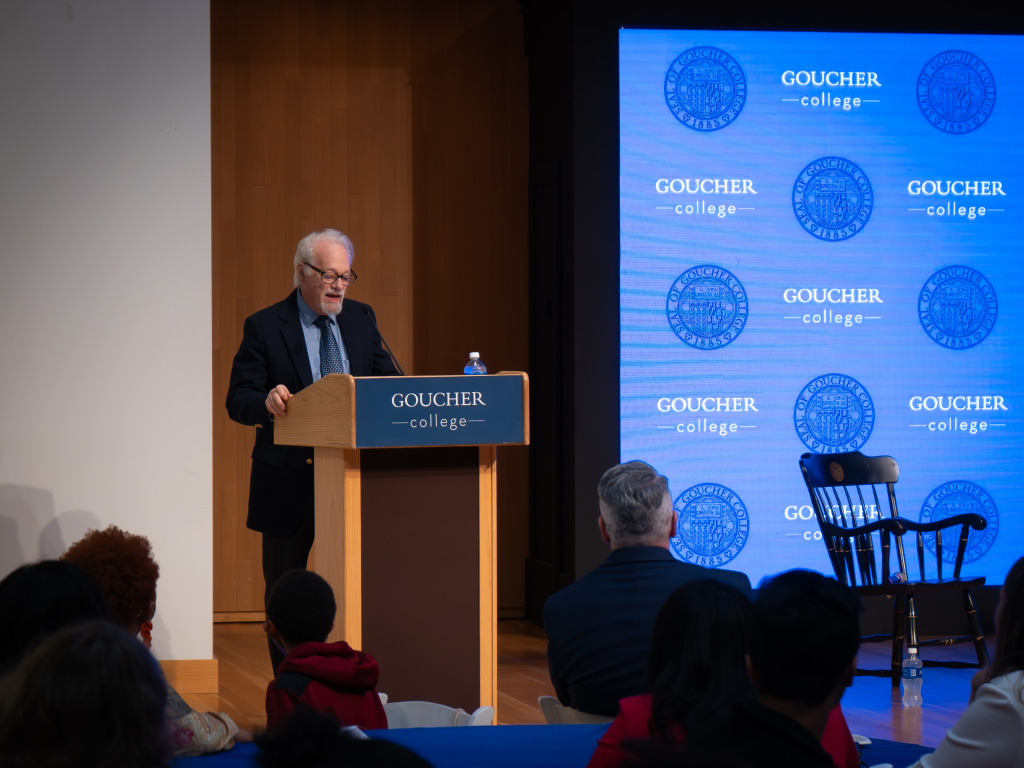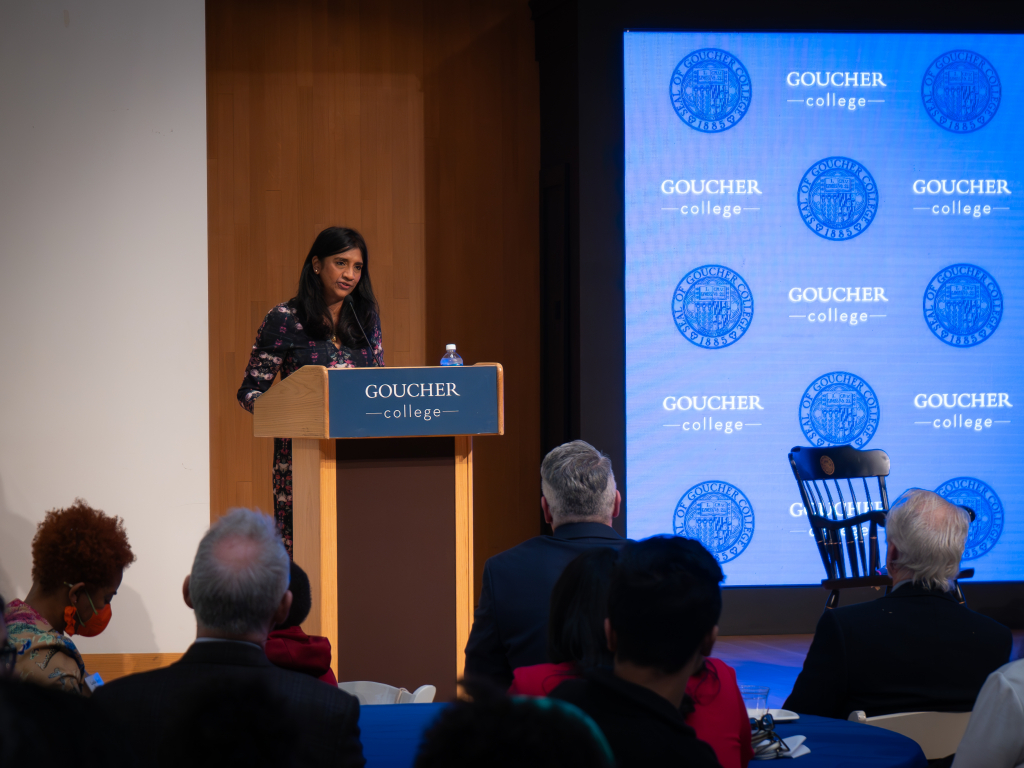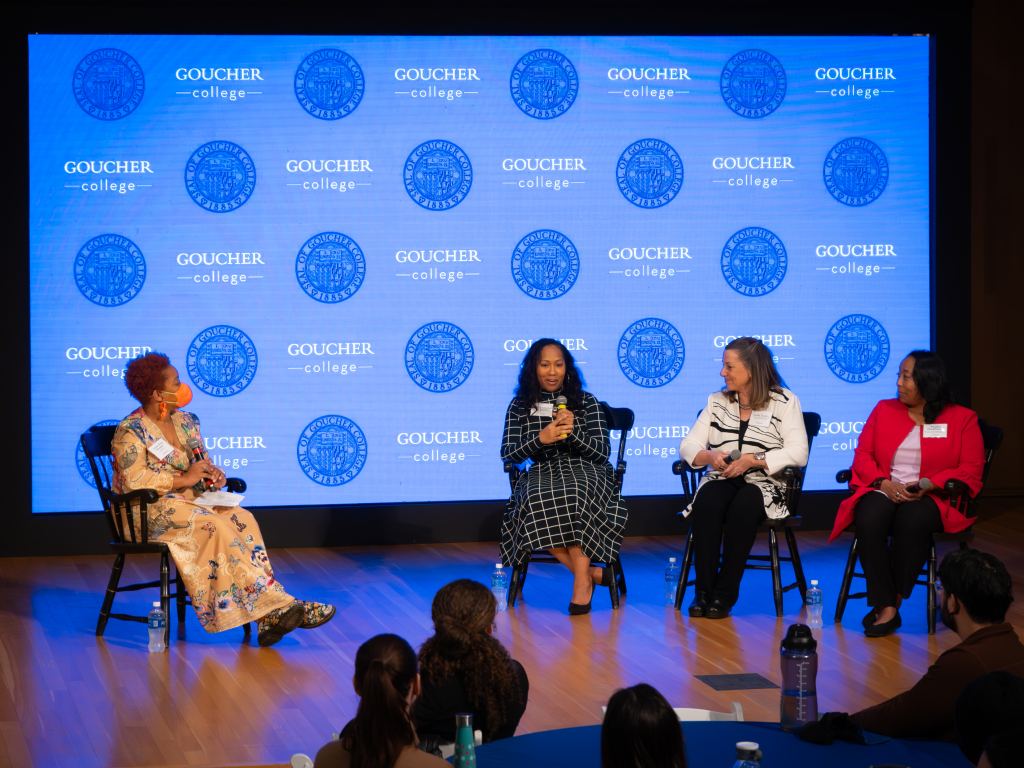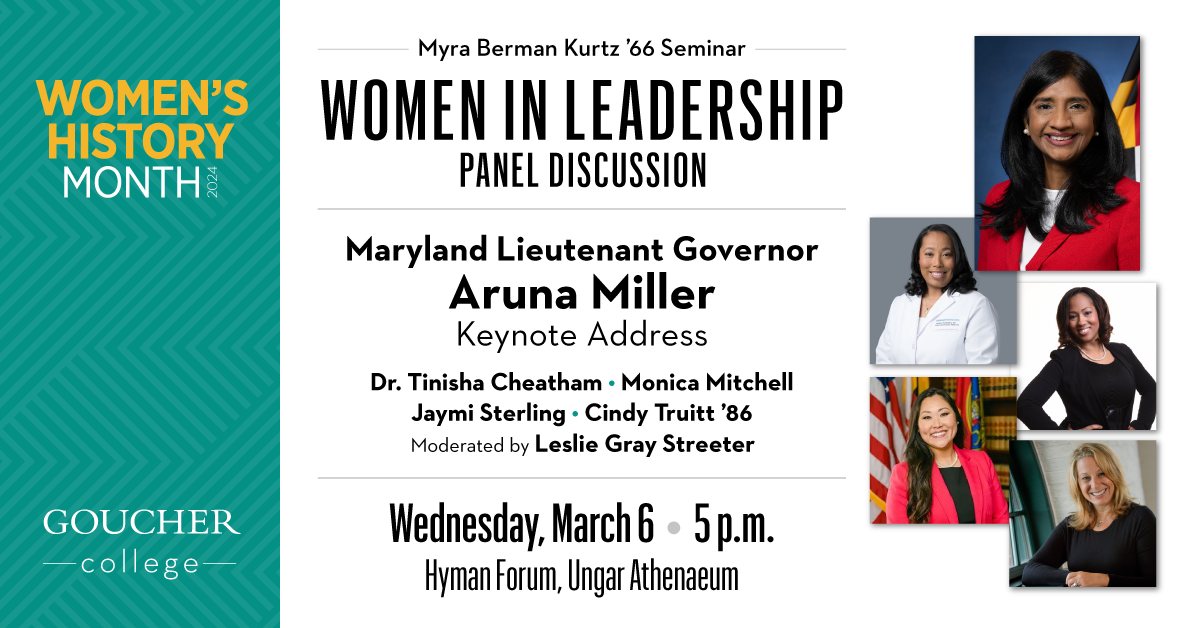On March 6, 2024, Goucher hosted the Myra Berman Kurtz ’66 Seminar Women In Leadership Panel Discussion in the Hyman Forum, kicking off a month of programming for Women’s History Month. The event was semi-formal, with a wide variety of snacks being offered, and about 100 students, staff, and faculty in attendance.
The keynote speaker was Aruna Miller, Lieutenant Governor of Maryland. Miller’s speech would be followed by a panel of three exceptional women. The panelists included Monica Mitchell, Senior Vice President and Chief of Staff for Wells Fargo; Cindy Truitt ‘66, Goucher Alumna, President and CEO of Humanim; Tinisha Cheatham, Physician in Chief of the Kaiser Permanente Medicine Baltimore Service Area. A fourth panelist, Jaymi Sterling, State’s Attorney of St. Mary’s County, was unable to attend due to an ongoing homicide trial, but wishes to return to Goucher at some point.
The event was opened by President Kent Devereaux, who spoke about the history of Goucher as a women’s institution, and mentioned that it was one of the very first higher education institutions to allow women into science classes. He then talked about Myra Berman Kurtz, a Goucher alumna and globally recognized expert in infectious diseases, whom this lecture is named after.

Afterward, Kurtz’s husband, Stuart Kurtz, spoke praising Goucher’s highlighting of women in leadership. He talked about how his late wife attended Goucher not just for opportunities to excel academically, but also to find opportunities for leadership, referencing a time during her freshman year, where a speaker taught her how to shake hands.
According to Stuart, when Myra was doing her PhD at Harvard, she was studying under a Nobel Prize-winning professor. When the mechanism of her Ph.D. thesis was found to be incorrect, she went to another faculty member and forged a lifelong bond with them. She then graduated in three years with two Ph.D. theses, a very difficult achievement that Stuart deeply admires her for.
Elaine Meyer-Lee, Goucher’s Provost and Senior Vice President of Academic Affairs, then introduced Lieutenant Governor Miller. Miller opened by talking about the importance of public speaking, thanking students for their generosity in listening to this event. She thanked Devereaux, Kurtz, and Director of the Sarah T. Hughes Center for Politics Mileah Kromer, whom she mentioned that she had a lot in common with, from their shared affinity for the Orioles to Miller’s excitement every time the Hughes Center’s Goucher Poll comes out.

Miller came to the United States from India at seven years old, and spoke about how she would not be standing here today if not for the brave Civil Rights leaders of the 1960s, as well as the Immigration Act of 1965 which lifted racial quotas and allowed people from the Global South to make a new life in the United States. “The fight for freedom is never about the freedom for one community, one group, one cause”, she said of those who fought for civil rights in the past and present. “Every victory has a ripple effect for all communities.”
Miller talked about her experience as the only Indian girl in her school, and how she picked a field where many people looked like her: engineering. She also spoke about how internships are crucial in introducing students to new experiences in the real world, specifically mentioning an internship she did in college in Hawaii, where she faced heavy barriers due to her location in the Midwest, and persisted until she was able to go. Miller praised the leader of the company in Honolulu where she interned for allowing her to have this opportunity.
Talking about how college is a launching pad rather than the rest of your life, Miller spoke about the 25 years she spent as a transportation engineer in Montgomery County, and how being an engineer intersects with public services. She joked about how building a sidewalk is sometimes even harder than building a highway. Miller, who is a product of “public schools, public university, and public investment”, says that she owes a great deal of debt to these policies, and feels like after being given these opportunities, she feels a great deal of responsibility, which is why she went in to public services
“Sometimes, you have plans for life. Other times, life has plans for you.” This statement from Miller exemplifies her unlikely political career. After Al Gore’s defeat in 2000, she had an epiphany and began volunteering for the local Democratic Party. After many years, the party asked her to run for an open delegate seat. When she refused, believing that she could never be elected because of who she is, her husband persuaded her that this was just another form of public service.
Miller said that this was one of the most profound decisions of her life. She remembers how the first time she ran, someone came up to Miller and asked what a “nice girl” like her was doing in the business of politics. She then told him that she was “not that nice”. During the 2022 gubernatorial election, Miller noted, when people were questioning why there were two people of color on the Democratic ticket, they were underestimating the underdogs, who have nowhere to go but up.
She then praised the voters of Maryland, who not only came out and elected the first Black governor with the highest percentage of votes in Maryland history, but elected the first gubernatorial ticket with two people of color in the history of the United States. She also noted that, reflecting the diversity of the state, 50% of Governor Moore’s cabinet secretaries are women, and 50% are people of color.
Miller closed her speech by talking about how history is not made by cynics, critics and naysayers, but by leaders. Talking about her experiences as the only brown woman in most of the spaces she was in for much of her life, she said that the “assignment” is not about fitting in, but about being your authentic self and changing the world.
Miller believes that there are two important days in the life of everyone: the first being the day one is born, and the second being the day they discover their “why”, as in what they were put on this Earth to accomplish. She also remarked that, “When you believe that life is happening to you, you’re a victim. When you believe that life is happening for you, you’re empowered.”
After students from Goucher gave flowers to Lt. Governor Miller, Cordelia Edwards ‘24 opened up the panel portion of the event by introducing the moderator, Leslie Gray Streeter, an acclaimed writer/journalist, and Maryland native. Streeter in turn introduced the three panelists by stating what they do for the communities around them and talking about the lives that they have changed.

The first question asked of the panelists was what Women’s History Month means to them. Mitchell said that women’s history represents all of history, praising great women like Hedy Lamarr who made great achievements but were neglected by society. She said that we should not only honor women of the past, but create a way forward for the women of the future.
Truitt, who was a member of the last all-women graduating class at Goucher, said that she finds great inspiration in history, that we should understand the consequences of history to avoid repeating its mistakes. She said that the need for a dedicated Women’s History Month names the need to continue to do work, and is the perfect moment for women to reflect on what they’re doing to better the world.
Cheatham said that Women’s History Month is important because of the challenges we still need to accomplish, and we need to continue to create more firsts for women. Cheatham also noted that she truly believes that sponsorship, as in people praising women regardless of whether they’re there or not, is very important, just as important as mentoring someone.
The participants were then asked about a time when they were the first in something. Mitchell talked about an article that came out 20 years ago that listed funders of a museum, not including the company she was working for at the time. She then emailed the leader of the company about their priorities, and was subsequently invited to serve on the company’s philanthropic committee, where she was the only young Black woman. From there, she was promoted to Vice President while still in her 20s, and said that she never would have gotten to that position had she never had the initiative.
Truitt said that she had “so many firsts”, and credited her liberal arts education for helping her solve so many social problems. One of the ones she was most proud of was starting a program that helps lift people out of poverty and into a career. She also spoke about her experience as the first female CEO of a 50-year-old company serving disabled people, and praised the allies in her life who helped her reach this position.
Cheatham, who is half-Japanese, half-African American, talked about how she was both the first member of her family to go to college and the first one to become a doctor (as well as being the first Black female doctor at the hospital she worked at). She also praised her mother, who was disowned for being the first person in her family to date outside of her race, and her father, whose goal in life was to make sure that she, as a woman, could survive by herself. She recalled how, during the 2020 Black Lives Matter Protests, despite her hospital being engulfed by COVID, she led a town hall where she spoke about her experience as the mother of three Black boys.
The next question, which Streeter described as a “TikTok question”, was based on a TikTok about an overwhelmed young woman, and asked how we can strike a balance between understanding and telling people to suck up. Cheatham said that balance is the key, and that educators don’t do a good enough job of preparing people for the practical realities of healthcare. She said that in general, mentor figures need to make sure that everyone understands that there will be good and bad days, but that there will always be more good than bad.
Truitt added on by talking about how everyone has a choice, at every juncture of their life, and that not everyone has the same reality, especially those who live in a radically different world than the one she came into the workforce in. Mitchell then backed up Truitt’s point about the world being radically different, noting that there are fewer opportunities for younger people to disconnect. She then spoke about a time involving her kids, where she tried to talk to them, but they were suspicious because she wasn’t telling them to shut up. She then had an epiphany, and from then on began to prioritize her children more.
Streeter then asked the panelists about their first jobs, mentioning her own experience delivering papers, and how that led to her career as a journalist. Mitchell talked about an experience in second grade, where she made paperweights for her mom’s office in the form of pet rocks. When her mother went into work that day, she asked if anyone else wanted a paperweight, and Mitchell ended up making pet rocks for all of them, some of whom have the paperweights to this day.
Truitt spoke about her first job at a men’s clothing store called “Just for Men”, where she was routinely treated unfairly due to her position as a young woman working in a predominantly male establishment. Looking back, she said that the experience taught her a great lesson about boundaries, and how you can be good at something without going to the level typically asked of you. Cheatham’s first job was bagging groceries on the military base where she lived, where she was only paid in tips. There, she learned a lot about service, which sparked her interest in community, and taught her that “we lose nothing by being kind [to people].”
Streeter’s last question asked what the best advice the panelists ever gave is. Truitt, who said that she always lets people know the mistakes she made and what they could learn from it, says that the worst advice she ever got was that she needed to behave more “senatorial”, and the best was that she should be true to herself.
The last speaker was Dr. Kromer, who thanked Miller, Streeter, Mitchell, Truitt, and Cheatham for attending. She then thanked Goucher’s student body for attending, and the event ended with the panelists once again being presented with flowers.

